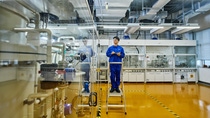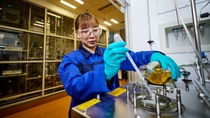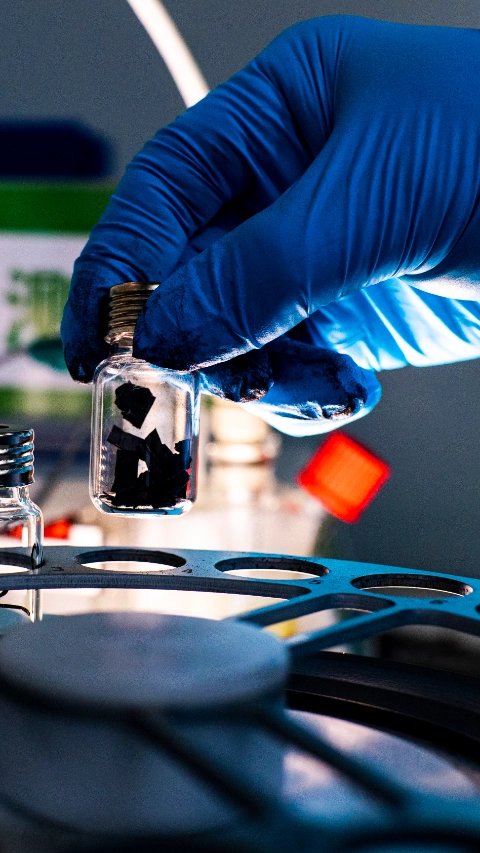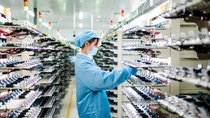BASF in Greater China 2022
Innovation
Innovation is the bedrock of BASF’s success as a leading chemical company and is the key driver for its profitable growth. Asia is now the largest regional chemical market in the world and there is a growing demand for more sustainable products and solutions. We focus on developing sustainable solutions for our customers by helping them to reduce their carbon footprint, use resources more efficiently or manufacture products in a more eco-friendly way. This is how we safeguard our competitiveness in the long term and make our contribution to the society.
Growing R&D capabilities in Asia Pacific
- Growing R&D capabilities will further accelerate innovations for BASF’s customers
BASF has been continuously expanding its research and development footprint in Asia Pacific to drive innovation by integrating customer and market needs at an early stage. BASF operates two Innovation Campuses respectively in Shanghai, China, and Mumbai, India.
The Innovation Campus allows BASF to bring together all the stakeholders in the innovation chain including research and development (R&D), business and production units in an integrated site. Each Innovation Campus is an integral part of BASF’s global Know-How Verbund and runs global, regional, and local R&D projects.
The Innovation Campus Shanghai, located at the BASF Shanghai Pudong Innovation Park, was inaugurated in 2012, and expanded in 2015 and 2019. Combining technical development capabilities of the operating divisions with industrial design expertise, the Innovation Campus Shanghai serves the demand of almost all major industries.
In 2022, BASF launched a new Elastollan® Thermoplastic Polyurethane (TPU), which is optimized for charging cables of fast charging piles. As the new grade is softer, it is more flexible and easier to handle than conventional charging cables of fast charging piles.
BASF won the 2022 Ringier Technology Innovation Award in the category "Architectual coating industry products" in recognition of its Acronal® PLUS 7679 which has succeeded in upgrading kids’ paint in the premium market of Greater China. Established since 2006, this award has been presented to pioneers in the coating industry.
The Innovation Campus Mumbai, with complementary research focusing on crop protection and specialty chemicals, is an important pillar of BASF’s growing R&D network in Asia Pacific. It includes state-of-the-art laboratories for chemical synthesis, application, and process development, as well as analytics. The Innovation Campus Mumbai brings all new and existing R&D activities in India under one roof. It is located next to the office building and the production plant of BASF’s Thane site in Navi Mumbai. In 2022, the Performance Products Discovery team inaugurated a new kilo lab facility at the Innovation Campus Mumbai. This facility will greatly help to improve the capabilities for kilo scale synthesis and process development projects, particularly in crop protection. The Innovation Campus Mumbai also organized an online scientific symposium (across global sites) on crop protection and research related topics, where experts from different fields and different regions shared their research findings.
In Changsha Hunan, BASF Shanshan Battery Materials Co., Ltd, a joint venture of BASF (51%) and Shanshan (49%), operates an advanced R&D innovation center that focuses on the development of metal recycling technology, precursors, and cathode active materials. Cathode active materials play a crucial role in improving the performance of lithium-ion batteries in electric vehicles and consumer electronics. Leveraging BASF’s global innovation network, researchers are now working together to accelerate product and application development that meets the diverse needs of customers and make e-mobility a reality for everyone.

A researcher is conducting a regular check at the valve reading in the Process Catalysis Lab at Innovation Campus Shanghai.
Driving open innovation with academia and industry
- The Network for Asian Open Research (NAO) promoting collaboration between BASF and researchers in Asia
BASF places great value on open innovation through close collaboration with academic and industry partners around the world. It maintains a global network of around 220 partners from universities, institutes, and companies, forming a key pillar of BASF’s global Know-How Verbund. In Asia Pacific, the Network for Asian Open Research (NAO) has been a joint platform steered by BASF as well as leading universities and institutes in the region since 2014.
In response to the call of the Chinese authorities to "strengthen the innovation engine and build a new high ground for independent innovation", Pudong New District in Shanghai has launched the GOI (Group Open Innovation)program, which aims to leverage the innovation resources and global innovation network of large enterprises to build a seven-in-one collaborative innovation system.
BASF joined the GOI with a new Open Innovation Center to be built with NAO. This new Open Innovation Center will form a mutually synergetic innovation community with high-tech innovative enterprises to promote effective transformation and value creation of scientific research results. It is thereby enhancing BASF's innovation efficiency and optimizing the ecosystem. The center plans to empower high-tech innovative enterprises. From 2022 to 2024, the scope covers the fields of technology, business and ecology.
Since the establishment of NAO, BASF and its partners have completed more than 135 joint research projects. Currently, NAO projects cover a wide range of research areas including recycling and upcycling, renewables, new application driven research (such as new monomers, polymers, formulations, analytics and processing technology), sustainable process research such as catalysis, plastic recycling, carbon capture and utilization (CCUS), e-mobility, as well as digitalization and smart manufacturing in R&D. For example, BASF is partnering with Sichuan University to explore improved solutions addressing important market needs such as high chemical resistance of polyamide blends.

A researcher is operating the reaction calorimetry in the safety lab at Innovation Campus Shanghai.
Nurturing research talents
- BASF's Postdoctoral Research Station recognized as "Collaborative Innovation" Case
- Fostering industry talents through “Fascinating Chemistry” program for 20 years
BASF was awarded as one of the "Top 10 Collaborative Innovation Foreign Invested Enterprises in Shanghai 2021". The company’s postdoctoral research station was recognized as a "Collaborative Innovation" case for foreign-invested enterprises in Shanghai by the Science and Technology Commission of Shanghai Municipality.
BASF was approved to establish a postdoctoral research station in China for the first time in 2021. From 2021 till 2025, BASF targets to recruit postdocs annually for a two-year research collaboration. BASF will provide the talents with a wide range of online and offline training courses, cutting-edge and challenging research projects, and an open research atmosphere. The establishment of BASF’s postdoctoral research station reflects our strong commitment to nurturing talents. In the future, the workstation will continue to bring new talents to the company within the enterprise, promote scientific innovation, open new channels for local R&D teams to cultivate talents, and provide various growth opportunities for high-level scientific talents.
In addition, BASF is supporting talents at all levels. Fascinating Chemistry was launched in September 2003 by Peking University and BASF. It is designed as a long-term elective course for non-chemical background freshmen to stimulate their interests and enthusiasms in chemistry and the chemical industry. Nationally renowned professors and BASF scientists form the dynamic faculty to interpret various aspects of chemistry in vivid presentations. The course comprises 14 lectures, covering topics like colloid and interfacial chemistry, polymer chemistry, synthetic chemistry, nanoscale materials, insights into the chemical industry, as well as chemical experiments. It is one of the most popular scientific courses in Peking University.



